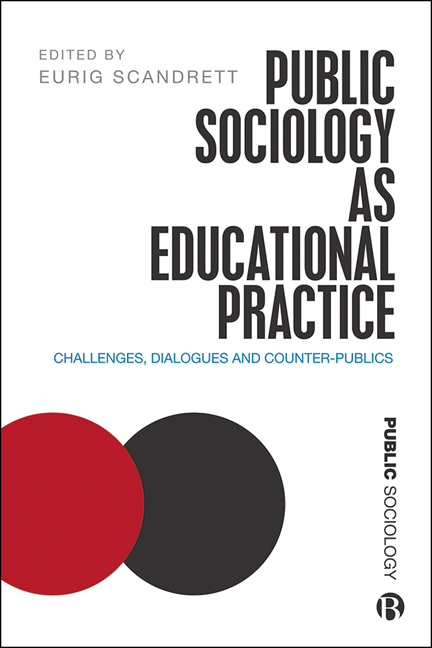Conclusion
Published online by Cambridge University Press: 02 March 2021
Summary
This collection makes an argument for understanding public sociology more dialectically. The focus of our practice is on dialogue, and the dynamics of knowledge production involves dialectical relations: between teachers and students; researchers and publics; practice and theory; between different practices of sociology reflected in Burawoy's ‘quadrants’; between the parochial and the universal; the local and global; and between the neoliberal university and the spaces that public sociologists find to engage in dialogue with subaltern counterpublics.
Through a process resonant with Burawoy's extended case method aiming to stimulate a dialectical process through provocation, case studies and dialogue, this book has foregrounded questions about the publics with which public sociologists engage. Nancy Fraser's concept of the subaltern counter public is used as a heuristic device for understanding the counter public spheres that public sociology as educational practice helps to create. It has also encouraged interrogation of the subalternity of the publics with which we engage. Through a series of dialogues, it has attempted to explore the extent to which public sociology as educational practice contributes to social processes in which mechanisms of exploitation and oppression can be challenged. This has helped to clarify that the ‘subaltern counter public’ device has heuristic, rather than definitional value for the practice of public sociology. It has helped to shape how we interpret the tasks of public sociologists as well as how publics interact with the social world and its negotiations over power, meaning and practices. This is a dynamic process. The subaltern counter public is not a fixed category of the social world, but rather always contingent, relational and subject to realignment.
These insights suggest that there is important work to be done by public sociologists at the interfaces of social change, and in the strains of social disruption that emerge. Such future work for public sociologists requires educational practice: in a strict pedagogical sense of formal, non-formal or informal education; but also in research, student support, community engagement, industrial relations and social movement activism. This would address the shifting dimensions of subalternity that may, in different contexts, be declining, emergent, contested, contradictory, contextual or incorporated.
- Type
- Chapter
- Information
- Public Sociology as Educational PracticeChallenges, Dialogues and Counter-Publics, pp. 343 - 356Publisher: Bristol University PressPrint publication year: 2020



